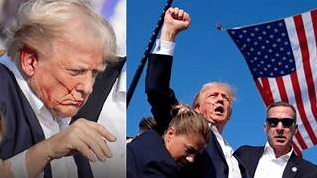How the attempt on Trump’s life will deepen the country’s bitter divides.
On 1 June, just two days after being convicted on 34 felony counts related to falsifying business records to conceal payments to a porn star, Donald Trump made a surprise appearance at an Ultimate Fighting Championship match in New Jersey. As he walked into the arena, pumping his fist to the sounds of Kid Rock’s “American Bad Ass,” the crowd erupted in wild applause. Trump’s political skill lies in his deep understanding of the power of resentment. Despite being a billionaire property magnate from a wealthy family, preferring a life of golf and television, he has reinvented himself as the valiant underdog, fighting for the forgotten masses against a so-called “deep state” and the “corrupt” elites. At a gathering of conservative activists, he proclaimed, “I am your warrior. I am your justice. And for those who have been wronged and betrayed, I am your retribution.”
This narrative of struggle and retribution has already created martyrs for Trump’s supporters. To them, the rioters convicted of storming the US Capitol on 6 January 2021 are “political prisoners” and “patriots,” individuals Trump has promised to pardon if re-elected. But perhaps no one is seen as more persecuted than Trump himself. Despite facing multiple convictions, impeachment, and being found liable for sexual assault, his followers view these as mere proof of how his powerful enemies have attempted to stop him at all costs. This belief has only deepened their loyalty to him, reinforcing their perception of him as a victim of a corrupt system.
The assassination attempt on Trump, just days after the violent event at his rally, will only strengthen these sentiments. For many of his supporters, this event will be seen not as an isolated incident, but as part of a larger conspiracy to eliminate him from the political scene. In their eyes, the deep state’s attempts to thwart him—whether through legal battles, political opposition, or now violent means—confirm their worst fears: that the establishment will stop at nothing to maintain its hold on power.
This sense of victimhood will feed into the country’s already sharp divides. The right will view the attack as further evidence of the systemic forces aligned against them and Trump, further galvanizing their support for his anti-establishment narrative. Meanwhile, those on the left will see it as a moment of political crisis, one that reflects the toxic state of American politics, where deep divisions and dangerous rhetoric have fueled an environment ripe for violence.
As the country grapples with the aftermath of the attack, the divisions between the two sides will only deepen. For Trump’s supporters, he is the heroic figure who is fighting for their interests, while for his detractors, he remains a symbol of the very forces they believe are undermining democracy and civic order. These competing narratives will continue to drive a wedge between Americans, making it harder for the nation to come together in the face of crises.
Ultimately, the attempt on Trump’s life will likely serve as a pivotal moment in the ongoing political and cultural battle in the United States. It will be remembered not just as an act of violence, but as a symbol of the broader ideological and political conflict that has come to define American society. The wounds inflicted by this event will take much longer to heal, and the country’s bitter divides will only grow more entrenched.

